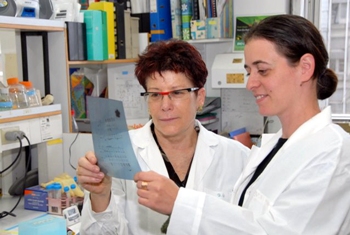| | 18 November, 2010
| | Hebrew University researchers discover expanded role for cancer-causing gene, paving way for new therapeutic investigation | |
 | | Dr. Shulamit Katzav-Shapira (left) and Galit Lazer. (Photo: Douglas Guthrie) |
|
Researchers at the Hebrew University of Jerusalem have discovered that Vav1 – an oncogene (cancer-causing gene) found in recent years to be one of the factors in tumorous tissue growth -- plays a wider role in several types of cancer than had previously been thought. The discovery has implications for further concentration on targeting this gene in cancer research.
The work of the researchers, led by Dr. Shulamit Katzav-Shapira of the Institute for Medical Research Israel-Canada at the Hebrew University of Jerusalem Faculty of Medicine, was published recently in the Journal of Biological Chemistry.
Vav1 has been known to be involved in alterations in gene expression in the immune system, where it is physiologically expressed. Vav1 was discovered a few years ago by Katzav-Shapira when she was working in the National Cancer Institute laboratory of Dr. Mariano Barbacid in the US. Since this newly identified gene represented the sixth oncogene detected in Dr. Barbacid's laboratory, it was designated by Katzav-Shapira as Vav (six in Hebrew) 1.
Vav1 is involved in the process whereby cells are “triggered” into action. When receptors on the surface of a cell, known as growth factor receptors, receive signals for growth, they relay this information into the cell. This chain of command is often called a ''signal transduction cascade'' or a ''pathway.'' Signal transduction cascades play a fundamental role in controlling normal cell proliferation, differentiation, cell adhesion, spontaneous movement, and programmed cell death.
Mutations in the proteins driving this signal transduction process are among the main causes for driving cells to develop into cancer. Thus, identification of the signal transducers that are involved in malignant transformation is a prerequisite for understanding cancer and improving its diagnosis and treatment. Since Vav1 was shown to be involved in events leading to alterations in gene expression in the immune system, it is a “key player” in this process.
Now, mutated Vav1 has been shown by Dr. Katzav-Shapira and others to be highly expressed also in neuroblasoma (a cancer that forms in nerve tissue), pancreatic and lung cancer. Indeed, it was surprisingly found to be expressed in 44% of malignant human lung cancer tissue samples that were studied. Since, say the researchers, Vav1 has now been shown to play a role in the process of abnormal tissue growth in several human cancers, it has become an even more highly important potential therapeutic target for cancer therapy.
Working with Katzav-Shapira on this project have been Galit Lazer, a doctoral student; Liron Pe’er, a master’s degree student; Dr. Marganit Farago, a research associate; and Dr. Kazura Machida and Prof. Bruce J. Mayer of the University of Connecticut Health Center.
|
Downloadable File: CancerKatzavShapira.doc |
|


